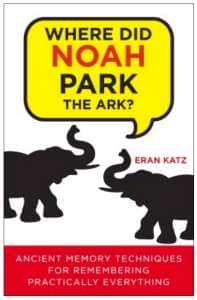 Is Where Did Noah Park the Ark any good?
Is Where Did Noah Park the Ark any good?
In a word, yes!
More substantially, I think it’s one of the best memory improvement books out there.
It dives deep into memory techniques, but it does something even better.
Eran Katz explores why it is that so many people struggle to take action on memory techniques.
And the solutions he gives are powerful.
Even better, he contextualizes where the techniques come from. And he gives you multiple references and sources you can follow up on to expand your knowledge.
So not only will you learn a ton about memory techniques from this book.
You’ll also discover some fun and easy ways to get yourself to use them too.
And in this review, I’ll give you a lot more details than any Goodreads review or “Peer Inside” tour on Amazon could ever possibly do.
Ready for the red carpet ride through Where Did Noah Park the Ark?
Let’s dive in!
Who is Eran Katz?
Eran Katz is the author of a number of memory improvement books.
Of course, lots of people write books on this topic, so how can you tell if he’s actually any good?
There are at least two ways.
First, you can watch him give a memory demonstration on YouTube.
And you can read this review that you’re going through now.
Frankly, I’m a big fan of Where Did Noah Park the Ark?
I’ve read dozens of memory improvement books from multiple historical periods, and I think this is one of the best of its kind. What kind is that? Read on to learn more after a few more words about its author.
Katz shares a bit about his background in this book, but not much beyond that is known about him.
His bio from this book is from 2010 and is nearly identical to the one on his website. It’s not clear how active he is today, but according to the book and his site, books aren’t the core way that he teaches. It seems that he presents most regularly at corporate events, which is pretty cool.
Anyhow, if you’re wondering whether or not his stuff is legit, the answer is a resounding yes. I’ve learned a lot from reading Where Did Noah Park the Ark?
And while researching this review, I found out from his Goodreads page that he’s written some novels. I’ll update this review after I’ve had a chance to read them.
He also has other memory improvement books, and these have been published in other languages. If you read Hebrew, you can check out the Hebrew version of his site for more information as well.
Where Did Noah Park the Ark? Review: What You Need to Know
The subtitle of this book is Ancient Memory Techniques For Remembering Practically Anything.
Does the book deliver?
Yes and no.
The techniques it covers are definitely ancient. And like Lynne Kelly’s work in The Memory Code and Memory Craft, Katz dives deep into the tradition.
This treatment of the older techniques is quite different from memory trainers like Harry Loryane, who only mentions older mnemonic devices in passing.
A Wider View On The Origins of Mnemonics
One of the coolest and most unique aspects of Katz’s book is how he expands the usual story we hear about the Greek origins of the Memory Palace.
You’ll learn about Hebrews, Egyptians and the connections between many cultures, including how Yiddish connects to German.
You also learn about the history of abbreviation systems, and small touches like this make Katz’s work really stand out.
Mnemonic Examples Abound
The book is also strong on mnemonic examples and Katz certainly has the skills for teaching how simple it is to use mnemonic imagery.
Like the best memory experts out there, he shows you that you don’t have to be creative at all.
For example, when teaching the number-shape system, he recommends eyeglasses as your image for the number 8.
Personally, I use a snowman, which is equally as direct and obvious. But I wouldn’t have thought about eyeglasses without reading this book. And this is just one example of many that Katz unfolds while discussing many memory techniques.
Multiple Approaches
When Katz says “practically anything,” in his subtitle, this is true to a certain extent.
It’s marketing-speak at the end of the day, and probably something his publisher came up with.
In reality, the book covers:
- Numbers
- Names
- Words
- Language learning
- Study methods
- The Roman Room technique
- Methods for memorizing spellings
- “Backronyms” for memorizing passwords
- How to stop losing things
- Presentations and speeches
All of those are good things, but they’re targeted.
Pros & Cons
Ultimately, I believe it’s a good thing to read any and every memory improvement book you can get your hands on.
But you might find yourself getting frustrated with this book because it covers so many possible ways to use memory techniques. Some topics feel shoehorned in for no particular reason, such as the very few pages devoted to memorizing playing cards.
And because there isn’t a single focus on just one kind of information type, you might find yourself floundering.
That said, Katz talks a lot about motivation, structuring your time and creating powerful incentives that pull you through multiple challenges. And if you’re a living, breathing human, you’ll certainly face more than a few as you go through life.
The Difference Between Reading & Doing Memory Techniques
Personally, I think the title of this book is confusing. Since none of us navigate Noah’s Ark, we don’t have any issues finding it after parking it.
But, the Biblical themes throughout the book also make the whole idea quite funny and engaging.
And Noah is a kind of symbol of perseverance. He was also the one who did what God told him to do. And that’s why he survived the flood.
The book is loaded with mental models you can adapt like this. One of my favorites is the idea that each of us has a “Superman Pill.”
As outlandish as that term sounds, the principle behind it is scientifically sound. Nir Eyal talked about his research into something similar when he was on the MMM Podcast.
And I love Katz’s many ideas for getting yourself to move from merely consuming information about memory techniques to actually putting them into practice.
Who Is This Book For And Should You Read It?
As mentioned, I think absolutely everyone can benefit from reading this book.
Whether you’re a beginner or an old pro with mnemonics, you’ll learn new things. Your perspective will expand. And you’ll probably laugh out loud quite a few times.
Given the book’s emphasis on study techniques, it will be particularly useful for people currently facing exams.
As a former professor myself, I’d have been delighted if my students used even half the study tips Katz covers in this book.
So if there is a problem with Where Did Noah Park The Ark? it is that it addresses itself to everyone.
I don’t really think that’s any reason not to read it. Just be prepared for a wild adventure through multiple memory techniques and possible use cases without a central focus on mastering any learning skill in particular.
You can rest assured that everything in the book is accurate to what memory techniques are and how they work. But Katz is definitely writing more as a general memory expert than a specialist in this book.
But despite being general, it’s probably the most unique general memory improvement book of its kind. You simply cannot lose by giving it a go.
And if you found this review useful, you’ll probably love my FREE Memory Improvement Kit:
Like Katz, I strive to bring you a combination of the technical nature of the techniques, context and motivation.
But unlike Katz, I tend to focus on specific goals with a bit more granularity.
If it sounds like something for you, give it a try!
Related Posts
- Memory Improvement Techniques For Kids
You're never too young to get started with memory techniques
- 20 Simple Memory Techniques That Work Wonders
Memory techniques are simple, but not always easy. This list of every memory technique will…
- Surviving PTSD With The Help of Memory Techniques Featuring Nicholas Castle
Nicholas Castle used memory training and memory techniques to help heal his PTSD. Listen to…






